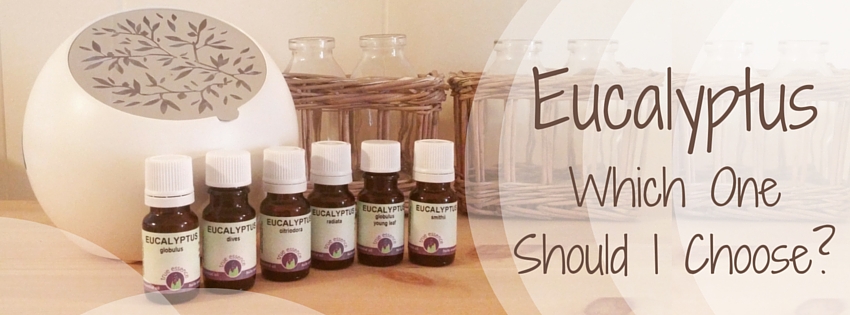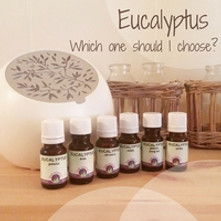
There are literally hundreds of varieties of Eucalyptus. Eucalyptus globulus is the most commonly available and familiar species, but there are about 15 varieties of Eucalyptus available to the aromatherapy market. It is important to know which species of Eucalyptus you are purchasing as each one has slightly different chemistry and therapeutic use. We recommend that you do not purchase Eucalyptus based on price, but on therapeutic benefit. Purchase Eucalyptus only if a vendor specifies which species is in the bottle.
In general, Eucalyptus oils are rich in the oxide 1,8 cineol. This constituent is considered highly mucolytic, which means it thins mucous in the respiratory tract, encouraging expectoration. Oxides are also strongly antiviral. Not only does Eucalyptus help the person suffering during illness, it offers protection to others coming in contact with the ill person. Eucalyptus is an excellent choice to diffuse during cold and flu season. Eucalyptus is less known for its spectacular bactericidal properties. The respected physician and pioneer in aromatherapy, Jean Valnet, used Eucalyptus for its antibacterial properties in a room spray. A 2% dilution was reported to kill 70% of airborne staphylococci. It is useful in many septic conditions.
Click on the button below to download a printable pdf of this blog article.
Australia, organic
(Narrow-Leaved Peppermint)
This species has about 70% of the oxide 1,8 cineole, plus monoterpenes and 3-4% aldehydes. It has a pleasing lemony fragrance and has a broad spectrum of action. It is anti-viral, expectorant and anti-inflammatory. It is a good immunostimulant, making it excellent for those who are run down and subject to frequent colds. Choose this oil in cases such as:
Common cold and influenza
Hoarse, scratchy throat
Runny or stuffy nose
Nasal congestion
Slight dry cough
Swollen tonsils
Upper respiratory viral illness (chronic and acute)
Eucalyptus radiata is a safe choice when treating children, especially combined with Eucalyptus smithii, or Eucalyptus globulus young leaves.
Portugal, organic, non- rectified (see explanation below)
(Blue Gum)
This species is high (about 80%) in the oxide 1,8 cineol and therefore preferred for treating congested, lower respiratory illnesses, such as:
Phlegmy cough
Cold symptoms
Bronchitis
Pneumonia (especially when used in conjunction with Tree Basil, Ocimum gratissimum)
SAFETY
Eucalyptus globulus can be a skin irritant. Dilute properly. Avoid use of this oil on younger children and babies due to the presence of the small amount of the ketone carvone. Use only on children 8 years and up. Do not use if you have high blood pressure or if you are epileptic. May contradict with homeopathy. These are powerful oils, so be careful with dosage.
HOW TO USE
Both of these Eucalyptus oils are wonderful choices when trying to heal from a respiratory illness. Some suggested methods of application include:
Bath (10 drops added to water or diluted in 30 ml milk or unscented body wash)
Diffusing Nebulizer (add 5-10 drops to the water and feel its benefits in the air!)
Aromatherapy Inhaler (saturate half the wick with your choice of Eucalyptus and keep handy in your pocket for decongesting a stuffy nose)
Diluted in a carrier/base oil for rubbing the chest, back and feet (5 drops essential oil per 10 ml of carrier oil)
If you are suffering from a common winter virus or bacteria, in addition to Eucalyptus there are other oils that would be an essential addition to your self-care. Consider adding:
Ravintsara (anti-viral and anti-bacterial)
Tea Tree(sinus congestion)
Thyme thymol (for infection)
Peppermint(decongestant/not for children under 8)
EUCALYPTUS RECTIFICATION
Most of the Eucalyptus globulus sold on the market today has been rectified. Rectification is a re-distillation of the essential oil, in order to remove certain chemical compounds. Rectification of Eucalyptus globulus creates an oil that has a more agreeable and familiar odour, but in our opinion, also results in an oil with a high irritant factor, making it a poor therapeutic choice. These chemical compounds that are missing in the rectified oil have many vital benefits including a protective quality to the respiratory tract. They are also what give Eucalyptus globulus oil its distinctively strong scent as oppose to the deodorized rectified version more commonly known. Our Eucalyptus globulus has a stronger odour due to the fact that it is non-rectified and thus unaltered and whole.
The subject of rectification is a topic of great debate among aromatherapists. At Rae Dunphy Aromatics, we are committed to sourcing and offering our customers pure, unaltered essential oils. Altered (or adulterated) oils are often missing the trace chemical compounds that are so integral to an oil’s therapeutic benefit. It is for this reason that we do not sell rectified Eucalyptus globulus essential oil. The Eucalyptus globulus oil we carry is organically grown in Portugal where local regulations do not require the Eucalyptus globulus oil be rectified, as it is in other countries.
Australia, organic
(Lemon-Scented Gum)
This lemony scented oil is often mistaken for Citronella or Lemongrass because of the high concentration of the aldehyde citronellal. It is indicated for arthritis, muscle and joint pain, skin care and cellulite. The aldehyde content lends this oil a sedative quality. Monica Haas (Quick Reference Guide) says that one of the most effective anti-inflammatory agents of natural medicine is a blend of Eucalyptus citriodora and Everlast (Helichrysum italicum). The synergistic combination of the citronellal and citronellol make this oil anti-bacterial against S. aureus. It has also shown effectiveness against Candida and other fungi.
Australia, organic
(Broad-Leaved Peppermint)
The presence (40-50%) of the ketone piperitone is harmless, but does makes this oil contraindicated for babies and pregnant women. This oil is antibacterial, anti-infectious, antiviral and mucolytic. It is effective for bronchitis where fluidifying the mucous is desired. Mix with Eucalyptus radiata to create a balanced, effective blend. It is cicatrizant (promotes healing through the formation of scar tissue), antifungal (Candida), and useful in arthritis, muscular aches and pains, rheumatism, sports injuries and strains. A blend of Eucalyptus dives, Inula, Rosemary verbenone and Peppermint is very useful and effective for sinus infection and congestion.
EUCALYPTUS GLOBULUS YOUNG LEAVES
Corsica, organic
This oil is distilled from the leaves of the Eucalyptus globulus that are under two years old. Due of the young age of the plant material, the regulations in France do not require this oil to be rectified. This is an oil with a lovely, soft fragrance. The oil has not developed many of the irritating components of the mature oil. It makes an excellent choice for cold and flu blends for young children or seniors. In skin care it is useful for wrinkles and scars. This oil comes from one of our favourite biodynamic producers in Corsica. This is a very special oil!
South Africa, organic
(Gully Gum)
This variety of Eucalyptus has no known contraindications and is one of the better choices for blends for children. It is expectorant, decongestant, antiviral, and anti-infectious. Use for bronchitis, coughs, colds, and flu. It has analgesic properties making it useful for painful joints and muscles. It is a very balancing oil having a calming effect when used in the evening and stimulating when used in the morning.
References:
The Aromatherapy Practitioner Reference Manual, by Sylla Sheppard-Hanger
The Complete Guide to Aromatherapy 2nd edition, by Salvatore Battaglia
l’Aromathérapie exactement, by Franchomme & Pénoël
Advanced Aromatherapy, by Kurt Schnaubelt
Aromatherapy A-Z, by Patricia Davis


